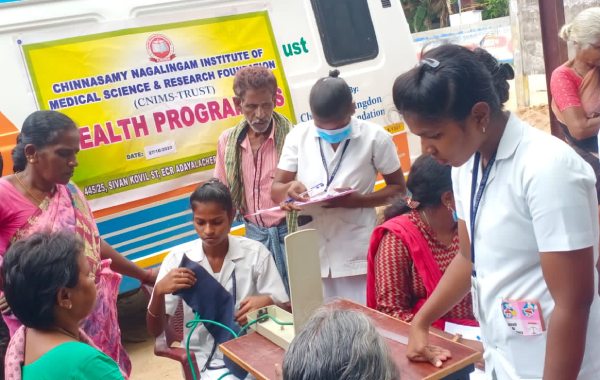- +91 8148143898
- ECR, Adayalachery Village, Chengalpattu District.
Founded in 2018, CNIMS Research Foundation serves the underserved rural communities of Lathur and Thirukazhukundram blocks of Chengalpattu District, Tamil Nadu. Adopting a holistic approach, we empower rural communities to mobilize, organize, and work towards their own upliftment.
We ensure equitable access to education, health, and socio-economic development with a special focus on women and the marginalized population. Our initiatives have empowered our beneficiaries to break free from the diverse challenges and reshape their future.
CNIMS envisions an equitable future where rural communities are empowered to mobilize, organize and work towards their own upliftment
CNIMS is on a mission to empower rural communities, with a special focus on the marginalized sections. We seek to ensure equitable access to education, health and socio-economic development through a participatory, evidence-based approach, educational programmes, network building, community outreach, training, campaigns, and more.

Our core values form the foundation of everything we do, guiding us in all our endeavours and propelling us in the accomplishment of our goals.

At CNIMS Research Foundation, we use an evidence-based, integrated, and multidimensional approach to create a lasting impact for beneficiaries. Our integrated approach ensures that our initiatives lead to a sustainable outcome that can drive transformative change.

Having lived in this area and worked with the community in the implementation areas, we observed that the number of girls entering into higher education is quite low. This is owing to the intersectional burden of gender, caste, class, and location combined informational poverty. Lathur and Madhurantakam blocks have the over 40% SC population, among the highest in Tamil Nadu.
Since familial situations, prevailing gender norms, and poverty prevent women from pursuing higher education, they tend to get married early. This leads to early pregnancies and higher fertility rates. They are relegated to domesticity and unpaid domestic and care work. Further, without proper skills and knowledge, these women are only able to access casual or daily wage work that pays them a pittance. This is why we started our journey here.

“Our vision at CNIMS Research Foundation is to create happy, healthy, aware and empowered rural communities. Through holistic and research-based activities, we are working towards empowering rural communities at large, with a special focus on socio-economically disadvantaged women, children and youth.” - Founder, CNIMS Research Foundation